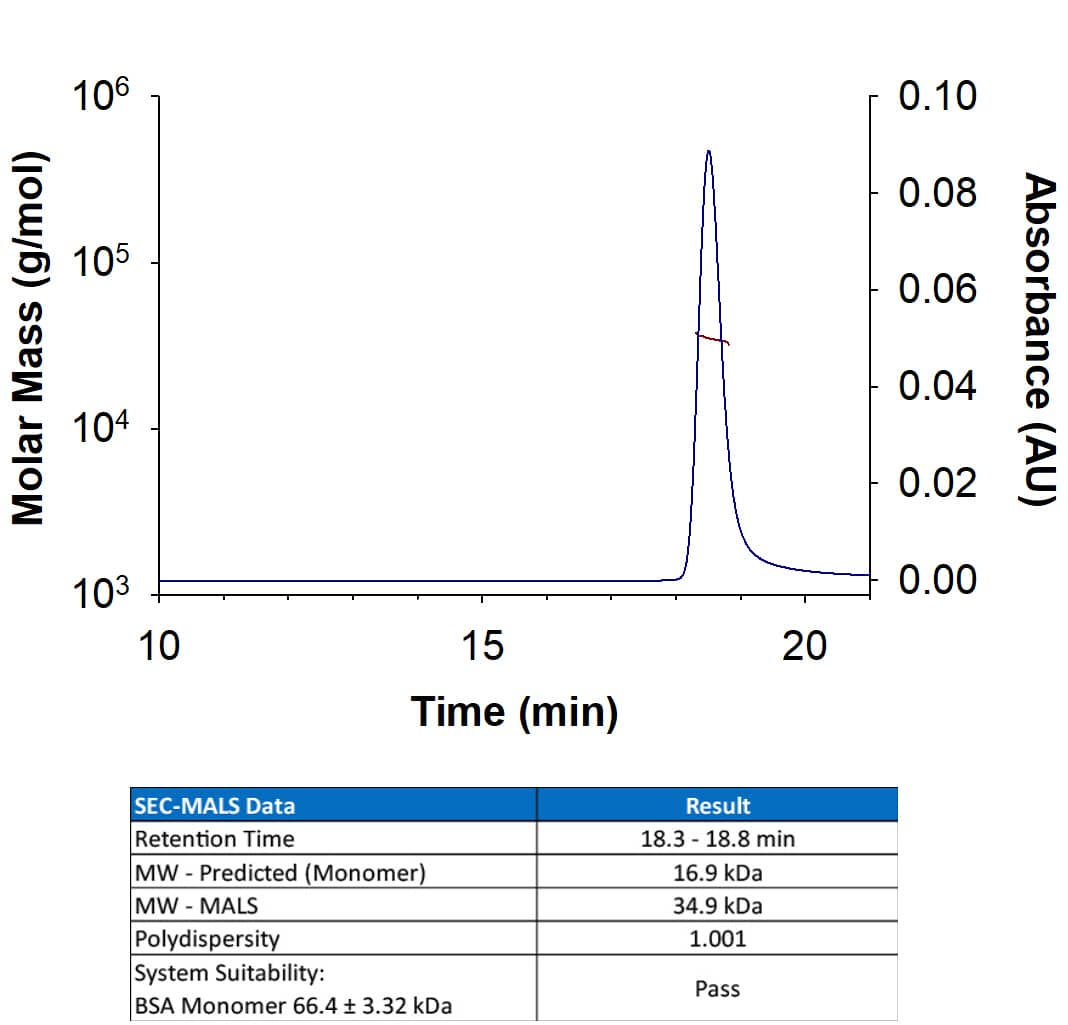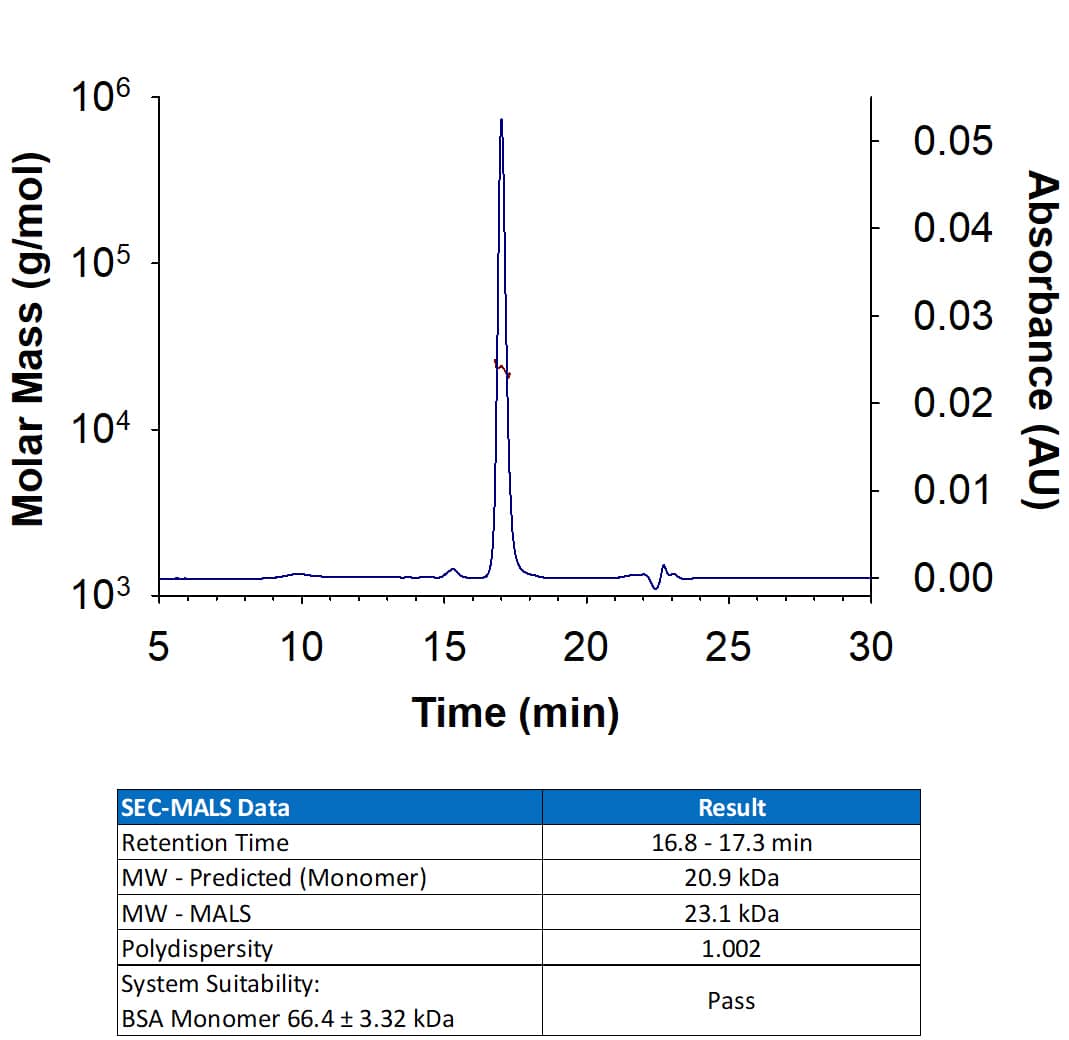Recombinant Human IFN-epsilon Protein Summary
Product Specifications
Leu22-Arg208 (Cys175Ser), with an N-terminal Met and a C-terminal 6-His tag
Analysis
Customers also Viewed
Product Datasheets
Carrier Free
CF stands for Carrier Free (CF). We typically add Bovine Serum Albumin (BSA) as a carrier protein to our recombinant proteins. Adding a carrier protein enhances protein stability, increases shelf-life, and allows the recombinant protein to be stored at a more dilute concentration. The carrier free version does not contain BSA.
In general, we advise purchasing the recombinant protein with BSA for use in cell or tissue culture, or as an ELISA standard. In contrast, the carrier free protein is recommended for applications, in which the presence of BSA could interfere.
9667-ME
| Formulation | Lyophilized from a 0.2 μm filtered solution in Citric Acid and CHAPS with BSA as a carrier protein. |
| Reconstitution | Reconstitute at 250 μg/mL in water. |
| Shipping | The product is shipped at ambient temperature. Upon receipt, store it immediately at the temperature recommended below. |
| Stability & Storage: | Use a manual defrost freezer and avoid repeated freeze-thaw cycles.
|
9667-ME/CF
| Formulation | Lyophilized from a 0.2 μm filtered solution in Citric Acid and CHAPS. |
| Reconstitution | Reconstitute at 250 μg/mL in water. |
| Shipping | The product is shipped at ambient temperature. Upon receipt, store it immediately at the temperature recommended below. |
| Stability & Storage: | Use a manual defrost freezer and avoid repeated freeze-thaw cycles.
|
Scientific Data
 View Larger
View Larger
Recombinant Human IFN-epsilon (Catalog # 9667-ME) demonstrates anti-viral activity in HeLa human cervical epithelial carcinoma cells infected with encephalomyocarditis (EMC) virus. The ED50 for this effect is 100‑500 ng/mL.
Background: IFN-epsilon
Interferon-epsilon (IFN-epsilon) is a secreted, approximately 23 kDa member of the type I interferon family of molecules (1). Mature human IFN-epsilon shares 62% and 60% amino acid sequence identity with rat and mouse IFN-epsilon, respectively. IFN-epsilon signals through IFN‑alpha / beta R1 and IFN‑alpha / beta R2 and contributes to TNF-alpha induced signaling (2, 3). It is constitutively expressed in epithelial cells lining the lung, intestines, testes, and female reproductive tract, and it is further up-regulated in the uterus by estrogen (2-6). IFN-epsilon provides mucosal barrier protection against the pathogens Chlamidia and Herpes simplex virus 2 (2). It induces B cell activation, attraction of CD8+ T cells to sites of virus infection and directly mediates protection against viral and bacterial genital infections (5, 7). Differential regulation of genes related to central nervous system by recombinant human IFN-epsilon suggests its role in maintenance of the structure and function of brain (8).
- Wijesundara, D.K. et al. (2014) Front. Immunol. 5:412.
- Fung, K.Y. et al. (2013) Science 339:1088.
- Matsumiya, T. et al. (2007) J. Immunol. 179:4542.
- Demers, A. et al. (2014) J. Leukoc. Biol. 96:1101.
- Xi, Y. et al. (2012) Mucosal Immunol. 5:610.
- Hermant, P. et al. (2013) PLoS One 8:e71320.
- Day, S.L. et al. (2008) J. Immunol. 180:7158.
- Peng, Fu-Wang et.al. (2007) Protein Expression and Purification 53:356.
Citations for Recombinant Human IFN-epsilon Protein
R&D Systems personnel manually curate a database that contains references using R&D Systems products. The data collected includes not only links to publications in PubMed, but also provides information about sample types, species, and experimental conditions.
2
Citations: Showing 1 - 2
Filter your results:
Filter by:
-
Interferon Epsilon-Mediated Antiviral Activity Against Human Metapneumovirus and Respiratory Syncytial Virus
Authors: Martínez-Espinoza, I;Babawale, PI;Miletello, H;Cheemarla, NR;Guerrero-Plata, A;
Vaccines
Species: Human
Sample Types: Whole Cells
Applications: Bioassay -
A sensitive assay for measuring whole-blood responses to type I IFNs
Authors: Gervais, A;Le Floc'h, C;Le Voyer, T;Bizien, L;Bohlen, J;Celmeli, F;Al Qureshah, F;Masson, C;Rosain, J;Chbihi, M;Lévy, R;Castagnoli, R;Rothenbuhler, A;Jouanguy, E;Zhang, Q;Zhang, SY;Béziat, V;Bustamante, J;Puel, A;Bastard, P;Casanova, JL;
Proceedings of the National Academy of Sciences of the United States of America
Species: Human
Sample Types: Whole Cells
Applications: Bioassay
FAQs
No product specific FAQs exist for this product, however you may
View all Proteins and Enzyme FAQsReviews for Recombinant Human IFN-epsilon Protein
Average Rating: 4 (Based on 1 Review)
Have you used Recombinant Human IFN-epsilon Protein?
Submit a review and receive an Amazon gift card.
$25/€18/£15/$25CAN/¥75 Yuan/¥2500 Yen for a review with an image
$10/€7/£6/$10 CAD/¥70 Yuan/¥1110 Yen for a review without an image
Filter by:
Reason for Rating: We don't plan to publish data yet














